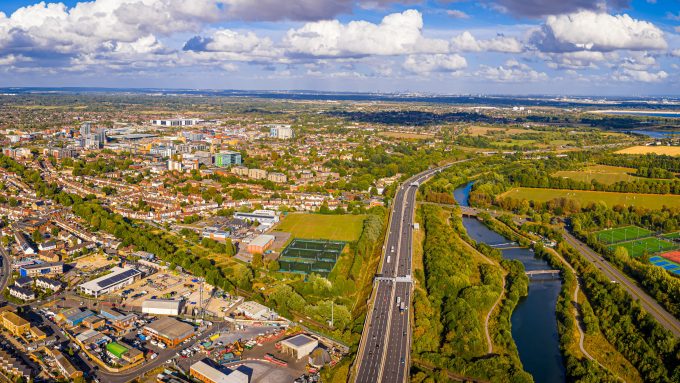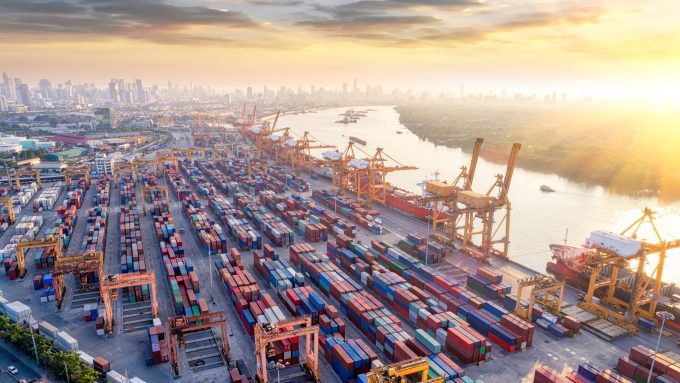
Meet the academic developing a new social scale for greener transport

People broadly understand the imperative to reduce carbon and there are plenty of new products and ideas in development to help cut emissions. But whether innovations fully consider the needs of the public – or help them make informed choices about changing their travel behaviours – is another matter.
Monika Büscher from Lancaster University is making an impact by bringing technology, communities and climate action closer together. She leads development of a new ‘societal readiness assessment dashboard’ as part of a national project called DecarboN8, to evaluate place-based transport decarbonisation innovations.
Monika is currently receiving support from the latest Transport Research and Innovation Grants programme, delivered by Connected Places Catapult on behalf of the Department for Transport.
Her new dashboard invites innovators, local authorities, third sector groups, communities, researchers and others to score transport decarbonisation innovations in terms of their societal readiness on a scale from one to nine – much like existing Technology Readiness Levels – and provide recommendations on how new ideas could be improved.
Achieving a six on the scale would, she explains, mean you are “doing pretty well” as it demonstrates engagement with stakeholders that goes beyond just speaking with them and ticking a box. Score a nine and the innovation promises to help decarbonise at a level “that contributes significantly to the reductions needed” while also “addressing social justice and providing societal good”.
This new scoring mechanism evaluates technology by asking how good the innovations and policies are from the perspective of both the climate and society, she explains.
“This will be hugely beneficial for innovators, because if they pay more attention to social aspects it could create great opportunities for better and more ambitious design and new services and products.”
Her new framework will invite different parties to come together to share what works and does not about a particular innovation and enter into “a reflective, creative dialogue on how it could be improved” to benefit different types of transport user and the climate. Monika is currently working with local authorities, innovators and community groups to develop the tool.
“We are on a tipping point of keeping to 1.5 degrees, but we are also at social and innovation tipping points too,” she says. “There's so much going on with people developing responses to the climate challenge, so we need to make it all work together.”
An overarching aim of the DecarboN8 project – and by extension the new societal readiness framework – is to help reduce carbon in transport. New technologies, fewer vehicle miles and more investment in active travel help. But the challenge is significant and goes beyond merely producing more electric cars, Monika explains. “At the moment we're spending a lot of effort in electrifying vehicles, but that takes road space away from active travel and won’t solve congestion. More systemic innovation is needed.”

Starting out in computer systems
Monika has been interested in protecting the world from the effects of climate change for many years, but began her career considering how digital technology could affect the world of work.
She studied geography at Bochum University in Germany and came to the UK to work as a language teacher, before enrolling on a culture and communication degree course at Lancaster University. She conducted research into how office management systems, hardware such as scanners and e-mail were leading to new practices at work and how colleagues went about sharing material. In a participatory design project, she worked with a firm of landscape architects who created photomontages by hand, and they experimented with ways their output could be produced digitally.
She helped staff on site to send images back and forth with the office, allowing speedier decision making. However, this change led to some staff losing their jobs. “This was a formative moment for me, and made me think about the ethics of technology, and the need for responsible research and innovation.”
Monika later got involved in a project looking at emergency response and people’s reaction to floods and wildfires. Her research on ‘crisis informatics’ considered how citizens and emergency professionals use digital media to share information during disasters. This led Monika and her research team to create a knowledge exchange platform and a board game that help practitioners explore how innovations can best be used to share information in emergency situations.
Considering the ethics of electric vehicles
Monika worked as a research fellow for about a decade, got involved in several EU projects and travelled around the world, spending time at other universities. She then re-joined Lancaster as a lecturer in sociology and expanded her focus to transport, joining the Centre for Mobilities Research.
“I've been working on the social side of innovation for a long time, looking at how to make technologies good for people and society.” But she recognises too that technologies which help individuals (such as private electric cars) may not be of great benefit to society as a whole, due to the use of depleting natural resources such as lithium. So she started to explore the potential for deploying smaller electric vehicles, shared vehicles or electric car clubs.
Micro mobility solutions such as electric scooters are an area of interest for Monika. But she is also mindful that their deployment in cities can cause problems, such as when they are abandoned in unsuitable locations.
Electric cars and scooters may be ‘technology ready’ but, she points out, “there is currently no means of saying they are ‘society ready’. This is one area where I hope the societal readiness framework will help, allowing local authorities to specify that a project needs a high societal readiness level before issuing a tender. If developers use our platform, they might come out with a higher score too.”
Societal need often “comes last on an agenda” but having a more formalised process such as her assessment framework could, she adds, “be really powerful”.
Making worthwhile connections
Monika got involved with Connected Places Catapult several years ago to discuss responsible innovation and user-centred design. “I have found it really inspiring to work with the Catapult, and its industry connections have helped to open up new pathways for me. I've already met some businesses who have told me they would like to do a societal readiness assessment.”
One is a group called the Zero Carbon Cumbria Partnership, which is pushing forward on the county’s plan to be net zero by 2037. Monika is working with them on how to think about future scenarios that place less emphasis on private vehicles and can address challenges in the Lake District, such as car dependency and economic inequality.
“There needs to be a more diversified mobility system in the area, with more focus on public or active travel and the potential for people to use folding bicycles or shared bikes,” she says. “Areas like National Parks would certainly benefit from a look at societal readiness.”
Monika says that a successful outcome for her in a few years would be for societal readiness scores to be widely embedded in procurement processes involved in taking forward carbon cutting transport initiatives. “That would be a real lever for better innovation.”
To be alerted about future opportunities at Connected Places Catapult, join our Academic Network.





